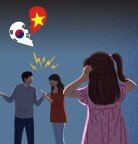The aftermath of ‘middle finger’ on social media
The aftermath of ‘middle finger’ on social media
Posted August. 08, 2017 07:08,
Updated August. 08, 2017 07:25
It is very challenging to get into a prestigious university in the United States. You need an excellent academic record and should be good at arts and sports with outstanding volunteer experience. A new condition has been added: not leaving inappropriate posts and pictures on social media. Harvard University has cancelled its admissions in June to 10 prospective students for the upcoming fall semester after finding that they exchanged offensive memes in private group chats.
The athletes of Atlee, a girls’ softball team in Atlanta, learned a pricey lesson on Sunday. They were disqualified from a tournament over a photo posted on a mobile messenger. After beating the unfriendly home team in the away match, they posted a "middle-finger" photo in excitement. The host of the tournament heavily punished them, saying that it is against the spirit of sports. A mindless photo on social media by young athletes could place them in trouble in the future. As a middle finger is very offensive in the U.S., it is better not to use fingers even when you refer to a person.
Though these cases did not happen in Korea, they still have a significant implication in Korean society where offensive comments, sexual harassment and online violence have been spreading. According to the Wall Street Journal, social media are minefields for the young generation. As more employers look into applicants’ social media accounts, excessive and inappropriate posts could place a stumbling block to their employment. Some were rejected to enter the United States. A German high school student told U.S. immigration officer that she was visiting her relative in the U.S. in 2013 but she was actually trying to do some part-time work. The immigration officer who searched her Facebook page learned this and expelled her from the U.S. Social media is not your personal diary book. You need to keep in mind that someone is watching you.
Being responsible for what you say and what you do in reality and online is to be confident about yourself, rather than being conscious of others. The Great Learning and the Doctrine of the Mean say, “Be sincere even when you are alone.” That means, do refrain from doing something against your moral obligation even when you are not with someone else. Lee Hwang, a Confucius scholar of the Joseon Dynasty, took this as a base for his self-discipline. Wouldn’t it be something that young people who are indulged in social media should bear in mind? At least not to regret at a later date.







